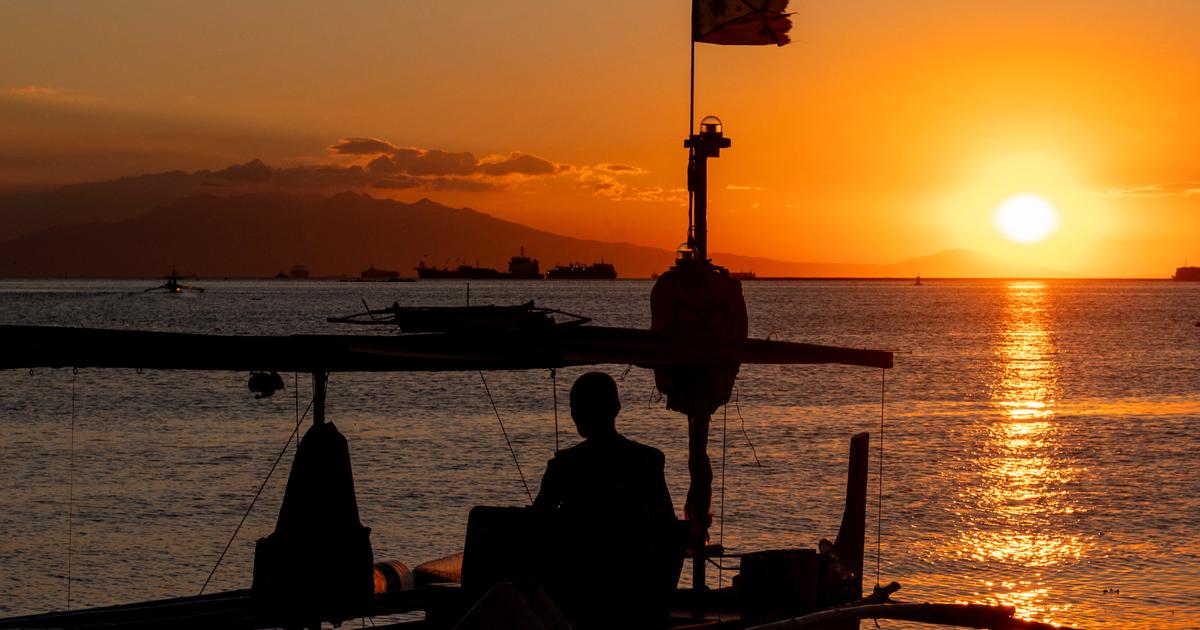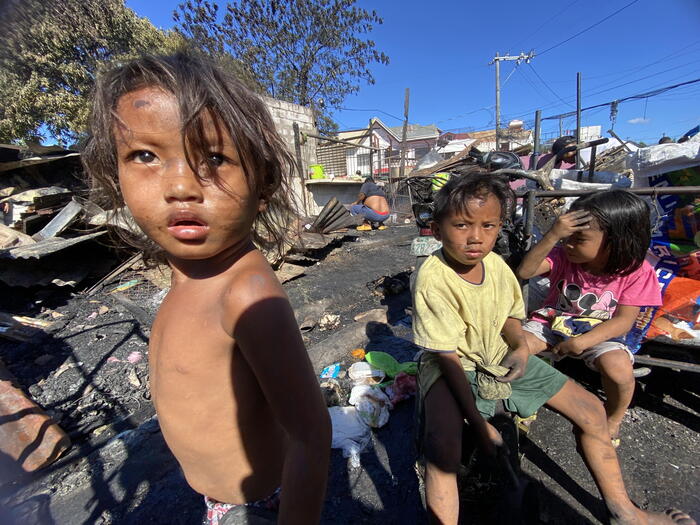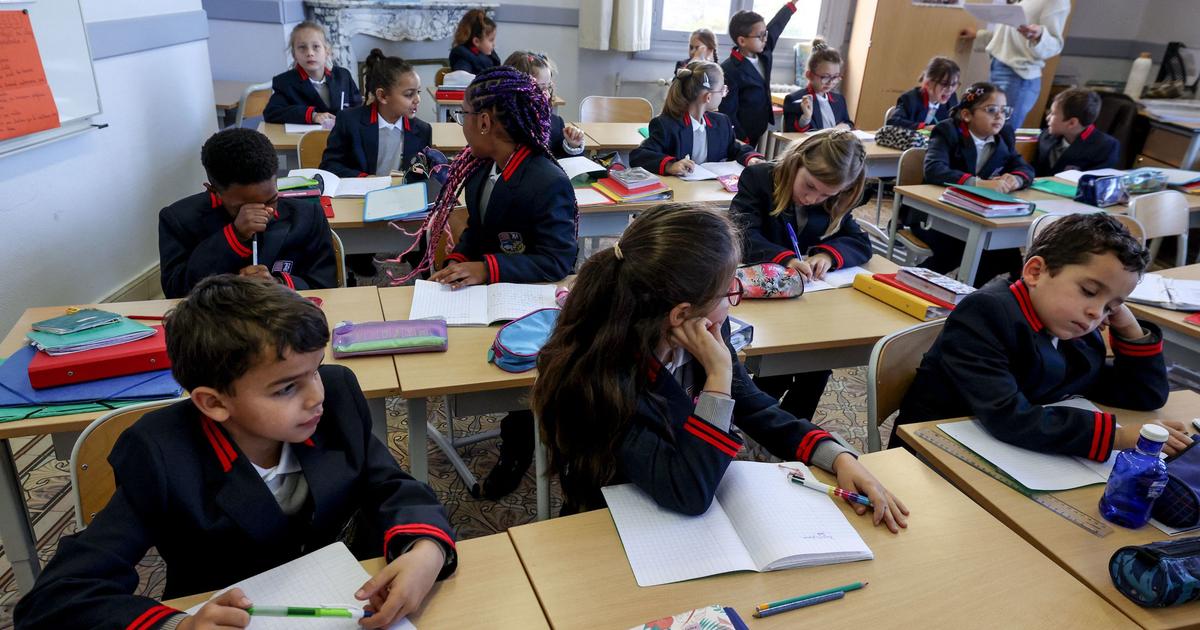Enlarge image
First day of school in the floods, but the main thing is to be together again: girls and boys in the Philippines returned to school in August – after more than two years
Photo: Lisa Marie David / REUTERS
“You can reach me during my lunch break.
For a good month now, I've been giving face-to-face classes again at a public school in the Philippines.
The children are back in the classroom four days a week, one day they continue to study from home.
My goodness, were the girls and boys excited when it started again!
My school here in Manila has 2,300 students between the ages of five and 15.
I run a kindergarten class, it's like a kind of preschool.
Enlarge image
Teacher Marie Josielle De Guzman in front of her preschool class in Manila
Photo: private
The children were able to get used to face-to-face learning surprisingly quickly.
But I notice that some are overwhelmed by the fact that there are suddenly so many children in the room with them that they are not used to seeing their parents for so long every day.
Many of them have spent most of their lives in a lockdown – with very strict contact and curfew restrictions.
That's how it was here, for many months.
As a result, the little ones have few friends and have not really learned to socialize.
They cry in class, they're scared.
The new everyday life is a stress test for them.
I have to change my mind too.
Our classrooms are small, there must be room for 30 children.
It's noisy and the rooms - in this tropical country - heat up quickly.
In addition, less than half of the children are vaccinated.
Everyone has to wear masks, but you know how it is with children: at some point the piece of fabric hangs under the chin.
Sometimes I think: Hui, we are all exposing ourselves to a great risk of infection here.
But so far the Covid cases have been limited.
The most important thing is that we can finally all learn properly together again.
There are children with whom we teachers had completely lost contact in the past Corona years.
Because they don't have good internet at home, laptops or iPads to study on, take online classes.
These children had zero educational opportunities during the pandemic and are now back in the grade they were in three years ago.
So you haven't made any progress at all.
Our school tried to get technical equipment for needy children through private sponsors.
But we didn't reach everyone.
Some parents had so many worries during this time - losing jobs, debts, marital crises - that they did not pay attention to their children's education.
There was also concern that possible domestic violence against children would go unnoticed once they stopped attending school.
To what extent there were cases, we have to find out first.
We have a counselor who randomly talks to the children and intervenes if necessary.
I don't want to sugarcoat anything.
The Corona years were not easy.
As a teacher, I am not trained for online teaching.
The feeling of not being able to reach all the children because they didn't have the right equipment nagged me a lot.
Like me, many colleagues copied material at their own expense and brought it to the children and bought books.
I read an article that 15 percent of Filipino teachers burned out over time.
There have been reported two cases of suicide among female teachers in Manila.
Why was this time particularly hard for us?
Well, we work in shifts, classes take place from six in the morning to five in the afternoon – one group of children comes early to noon, the other group late morning to afternoon.
A teacher at a public school earns 24,000 pesos a month at the beginning of her working life, which is about 450 euros.
After ten years as a teacher, I now earn 500 euros.
Which is about the average wage in Manila.
However, we mostly pay for the materials we need for the lessons out of our own pockets.
In the higher grades, there are between 45 and 50 children for one teacher.
In normal times, that is a lot to shoulder, especially in an exceptional situation like a pandemic.
But I love my job.
The children are my motivation to persevere.
Whenever the thought came to me,
I can't do it anymore
, I thought:
What will become of the children if I stop?
And now, standing in the colorful classroom, I'm glad I'm still a teacher.
I never wanted another job.
Many parents are very grateful for this perseverance.
Some come to disinfect the tables in the afternoon, donate masks, or stop by to say thank you.
For the past week I have been talking to the children about feelings.
That it's okay to be sad or angry sometimes.
We have discussed that it is good when we talk about these feelings that we hold in our hearts.
That all feelings matter.
Happiness, of course!
But also all other emotions.
We imagined that feelings are like balloons floating in the air.
They come and go, and that's okay.
I think with this attitude you can get through the pandemic quite well, as a child and as an adult.
Because that’s still going for a while.«
This contribution is part of the Global Society project
Expand areaWhat is the Global Society project?
Under the title "Global Society", reporters from
Asia, Africa, Latin America and Europe
report on injustices in a globalized world, socio-political challenges and sustainable development.
The reports, analyses, photo series, videos and podcasts appear in a separate section in the foreign section of SPIEGEL.
The project is long-term and is supported by the Bill & Melinda Gates Foundation (BMGF).
A detailed FAQ with questions and answers about the project can be found here.
AreaWhat does the funding look like in concrete terms?open
The Bill & Melinda Gates Foundation (BMGF) has been supporting the project since 2019 for an initial period of three years with a total of around 2.3 million euros - around 760,000 euros per year.
In 2021, the project was extended by almost three and a half years until spring 2025 under the same conditions.
AreaIs the journalistic content independent of the foundation?open
Yes.
The editorial content is created without the influence of the Gates Foundation.
AreaDo other media also have similar projects?open
Yes.
With the support of the Gates Foundation, major European media outlets such as The Guardian and El País have set up similar sections on their news sites with Global Development and Planeta Futuro respectively.
Did SPIEGEL already have similar projects? open
In recent years, SPIEGEL has already implemented two projects with the European Journalism Center (EJC) and the support of the Bill & Melinda Gates Foundation: the "OverMorgen Expedition" on global sustainability goals and the journalistic refugee project "The New Arrivals ", within the framework of which several award-winning multimedia reports on the topics of migration and flight have been created.
Expand areaWhere can I find all publications on the Global Society?
The pieces can be found at SPIEGEL on the Global Society topic page.















